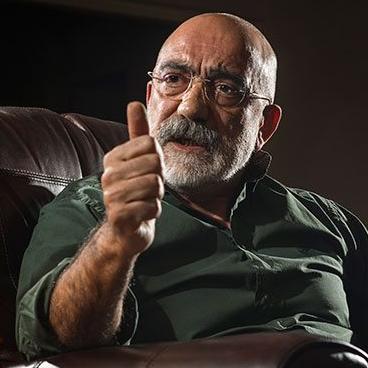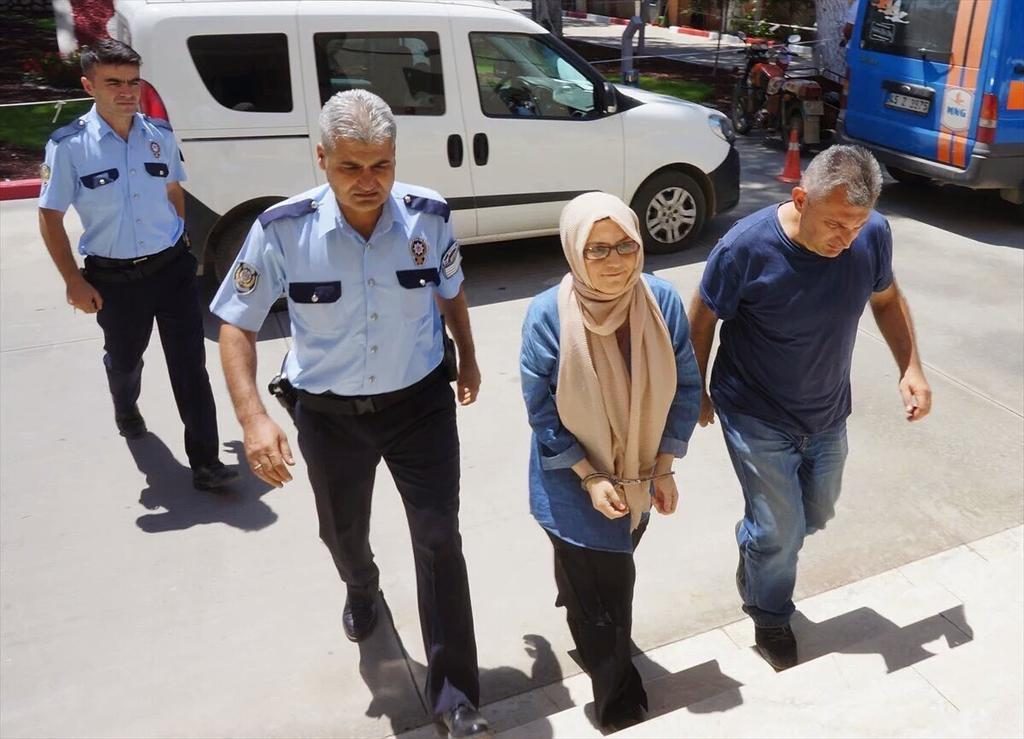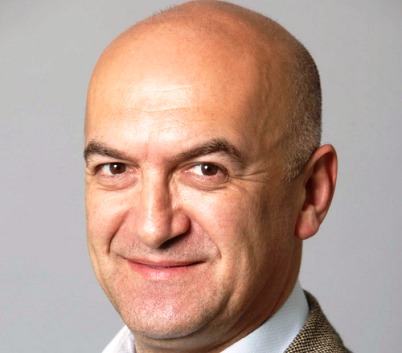20 Sep 2016 | Events, mobile
Join Index on Censorship and English PEN for a vigil outside the Turkish embassy in support of Ayşe Çelik and others currently persecuted for speaking out in Turkey. This vigil is part of a global campaign launched by the Initiative for Freedom of Expression – Turkey.
Çelik, a teacher, will stand trial beginning on Friday, accused of “promoting terrorist organisation propaganda” after she called in to a popular television entertainment show to plead for more media coverage of abuse and killings of civilians in Diyarbakir, south-east Turkey.
Thirty-one people who co-signed Çelik’s statement will also be tried alongside her. They all face more than seven years in prison if found guilty.
Index on Censorship stands with Ayşe Çelik and will not ignore this breach of her basic right to freedom of expression. We denounce the current crackdown undertaken by authorities in Turkey and call for the immediate and unconditional release of imprisoned writers Ahmet Altan, Mehmet Altan, Asli Erdogan and Necmiye Alpay.
We will be outside the Turkish embassy from 2pm to 3pm.
Here is the full statement that landed Çelik in court:
Are you aware of what’s going on in Southeast Turkey? Unborn children, mothers, people are being killed here. As a performer, as a human being you should not remain silent to what’s happening. You should say stop. I want to say one more thing. There are miserable people who are glad to hear that children are dying. We, more correctly I, cannot say anything to these people, but shame on you. I’m sorry I want to say one more thing. I’m a teacher and I’m asking all teachers (who fled the area): How will they ever go back to these places? How will they look at those innocent children’s faces and into their eyes? I can’t speak really. The things happening here are reflected so differently on TV screens or on the media. Don’t remain silent. As a human being, have a sensitive approach. See, hear and lend a hand to us. It’s a pity, don’t let those people, those children die; don’t let the mothers cry anymore. I can’t even speak over the sounds of the bombs and bullets. People are struggling with starvation and thirst, babies and children too. Don’t remain silent.
When: Friday 23 September 2pm
Where: 43 Belgrave Square, London SW1X 8PA (Map)
14 Sep 2016 | News and features, Turkey, Turkey Uncensored

Turkey Uncensored is an Index on Censorship project to publish a series of articles from censored Turkish writers, artists and translators.

Jailed Turkish journalist Ahmet Altan.
If made out of the right stuff a journalist is a tough nut. Some of us are, you may say, born that way. Our profession lives in our cells. We are compelled to do what our DNA instructs us to do.
Yet, these days, I can’t help waking up each morning in a state of gloom.
Never before have we, Turkey’s journalists, been subjected to such multi-frontal cruelty. Each and every one of us have at least one — usually more — serious issue to wrestle with. Many have already faced unemployment. According to Turkey’s journalist unions, more than 2,300 media professionals have been forced to down pens since the coup attempt. The silenced face a dark destiny: they will never be rehired by a media under the Erdogan yoke.
More than 120 of my colleagues are in indefinite detention – and that number does not include 19 already sentenced to prison. The latest to be added to the list are the novelist and former editor of daily Taraf, the renowned journalist Ahmet Altan and his brother, Mehmet Altan, a commentator and scholar.
The grim pattern of arrests comes with a note attached: “To be continued…”
Nobel Laureate Orhan Pamuk recently and eloquently summed up what Turkey is becoming: “Everybody, who even just a little, criticises the government is now being locked in jail with a pretext, accompanied by feelings of grudge and intimidation, rather than applying law. There is no more freedom of opinion in Turkey!”
Some of those who are still free, either at home or abroad, may consider themselves lucky – or at least be perceived as such. But the reality is that each and every one of us faces immense hardship.
Being forced into an exile, as I have been, is not an easy existence. Many like me have an arrest warrant hanging over their heads. Others are simply anxious or unwilling to return home.
Pressured by financial strains, a journalist in exile bears the burden of the country they have been torn from while remaining glued to the agony of others.
But there is more. Last week I offered one of my news analyses to a tiny, independent daily — one of the very few remaining in Turkey. Waiving any fee, I asked the editor — who is a tough nut — to consider publishing it. Soon, the text was filed and the initial response was: “This one is great, we will run it.”
Then came a telephone call. Because the editor and I have a friendly relationship, he was open when he told me this: “As we were about to go online with it, one editor suggested we ask our lawyer. I thought he was right in feeling uneasy because everything these days is extraordinary. Then, the lawyer strongly advised against it. Why, we asked. He said that since Mr Baydar has an arrest warrant, publishing a text with his byline or signature would, according to the decrees issued under emergency rule, give the authorities to the right to raid the newspaper, or simply to shut it down. Just like that. Tell Mr Baydar this, I am sure he will understand.”
I did understand. No sane person would want to bear the responsibility for causing the newspaper’s employees to be rendered jobless, to be sent out to starvation.
I have since published piece elsewhere.
This incident is but one in a chain, hidden in Turkey’s relative freedom. It’s a cunning and brutal system of censorship that aims to sever the ties between Turkey’s cursed journalists and their readership. It is a deliberate construction of a wall between us and the public. It is putting us in a cage even if we are breathing freedom elsewhere.
It’s enough to make George Orwell turn in his grave.
But there is some consolation. Thankfully we, the censored among Turkey’s journalists, have space to write about the truth, make comments and offer analysis in spaces like Index on Censorship. Thankfully, we have the internet, which is everybody’s open property, even if the sense of defeat when you awake some mornings leaves you convulsing in the gloom.
You know you have to chase it away and get on with what you know best: to inform, to exchange views, offer independent opinion, promote diversity, and hope that one day it will contribute to democracy.
More Turkey Uncensored
Can Dündar: “We have your wife. Come back or she’s gone”
Turkey: Losing the rule of law
Yavuz Baydar: As academic freedom recedes, intellectuals begin an exodus from Turkey
27 Jul 2016 | Europe and Central Asia, Mapping Media Freedom, mobile, News and features, Turkey, Turkey Uncensored

Büşra Erdal, who surrendered in Manisa, taken to police headquarters in handcuffs.
“It was very, very close,” according to a source who followed the case of columnist and human rights lawyer Orhan Kemal Cengiz. By a hair he had avoided detention. While Cengiz has now been released, he is unable to travel abroad.
During the interrogation, Cengiz had repeatedly been asked about critical tweets he had posted about a year ago. “Those who led the interrogation were utterly hostile, seemingly set for finding a pretext to hold him in custody,” my source said. Cengiz’s friends believe that his impeccable international reputation and his work for the European Court of Human Rights, where he has defended Kurds and even, in a couple of cases, Turkish Islamists against the state, may have saved him from a jail cell.
However, there is nothing to suggest the easing this post-coup witch hunt. Yesterday, the veteran journalist Nazlı Ilıcak was arrested at a police checkpoint in Bodrum and taken into custody. Judicial affairs journalist Büşra Erdal surrendered after she tweeted that she was being punished for her work. Sadly the powerful Doğan Media Group outlets, of which both honourable journalists are affiliated, remained silent. Not a word of support was seen in any of the group’s newspapers.
The only support came from the Enis Berberoğlu, former chief editor at Hürriyet and now MP and deputy of the main opposition Republican People’s Party (CHP), who tweeted: “As their superior once, I was mainly responsible for the stories and the sections that Bülent Mumay and Arda Akın wrote and worked for. I vouch and stand for them.”
Against the backdrop of the authorities’ search for 42 journalists, pro-government media was busy on Tuesday inciting hatred for the columnists and asking for their imprisonment, including the daily Akşam. The pro-Justice and Development Party (AKP) daily Sabah added to the flames by accusing columnists such as Hasan Cemal, Kadri Gürsel, Cengiz Çandar, Perihan Mağden, Mehmet Altan and others of provoking the coup. These journalists and columnists are no longer allowed to express themselves in any media outlet.
Perhaps more than anything else, it was a crucial legal appointment that worried Turkey’s dissident figures in media and academia. In a hasty move, the government named İrfan Fidan as the chief prosecutor for Istanbul. Until Monday, Fidan was a deputy attorney in Istanbul’s Anti-Terror and Organised Crime Unit. What’s most notable, however, is that Fidan was the prosecutor who sentenced Cumhuriyet editors Erdem Gül and Can Dündar to five years and five years and ten months, respectively, in prison. The pair had covered the alleged supply of arms to Syrian jihadist groups by the Turkish secret service.
Academic Esra Mungan and three others who had signed the peace petition for the Kurds clashed were also detained due to his efforts. In another example, Fidan had taken over the case that implicated high-ranking AKP ministers and president Recep Tayyip Erdogan’s family members in corruption. He dismissed all charges.
Many fear, therefore, that his appointment to such a powerful post may come to mean a steep escalation against journalists and scholars in the coming weeks.
All other signs, too, indicate harder times.
On Monday night, in the midst of turmoil, Erdogan ratified the law which, in practice, subordinates the high judiciary to the political executive and immediately after the Board of Judges and Prosecutors, led by the Justice Ministry, implemented a long series of appointments and removals in the Court of Cassation and Council of State.
Erdogan met with two opposition party leaders. CHP and Nationalist Movement Party leaders were invited, but not the third largest elected one, the pro-Kurdish Peoples’ Democratic Party. It was a deliberate choice, raising eyebrows on how serious the ruling AKP is about rebuilding democracy. In addition, Erdogan spoke for a possible extension of emergency rule for an additional three months.
Meanwhile, Turkey will be run by decrees and everybody knows what that means.
A version of this article was originally posted to Suddeutsche Zeitung. It is published here with permission of the author.

Turkey Uncensored is an Index on Censorship project to publish a series of articles from censored Turkish writers, artists and translators.
29 Nov 2013 | News and features, Turkey, Turkey Uncensored

Yavuz Baydar
Turkey’s “mainstream” media, politically and economically in shackles is moving towards submitting to the kind of conditions like those in Central Asian republics such as Azerbaijan. This progression was plain for all to see on live television this week.
Tuesdays have for a long time turned into political shouting matches in Ankara. Stretching the boundaries of parliament’s bylaws, leaders of the parties assemble deputies in so- called group meetings in the lawmakers’ building, where they unleash propaganda.
These appearances are, as obliged by law, broadcast by the state-run TRT channels.
But, as Turkey’s Prime Minister Recep Tayyip Erdoğan has systematically tightened the screws over the proprietors of the conglomerate media, all the national private news channels – there are at least 15 of them – for months turned this custom into a routine of airing his lengthy, loud speeches without interruption.
Last Tuesday, the disturbing pattern went even further. It was the the beginning of the local elections campaign, so Erdoğan let media know that he would announce the names of some of the minor mayoral candidates, in the group meeting.
Amid pomp and circumstance, he did. The entire meeting was meticulously designed as a massive propaganda show for the AKP, backed with lengthy video clips on the achievements in each and every city. And the private media followed herdlike in airing it live.
Many wondered whether Turkey had turned into Azerbaijan or Turkmenistan overnight.
“Unbelievable!” wrote Hasan Cemal, a veteran colleague who was forced to leave Milliyet daily for his defence of good journalism 6 months ago. “Election propaganda that can only be done by paid adverts was sent live on all the channels. This can never happen in any democratic country. I would not wish to be in the place of my colleagues who had to do this.”
The truth of the matter is, by each step, because of the enthusiastic consent of media proprietors in Turkey, either blinded by greed, or frightened to submission or both – to surrender fully to the will of political power, there is not much basic journalism left in the country. All this has been happening against the background of Turkey’s accession process with the European Union.
in a recent update of two earlier reports by the liberal think-tank, TESEV, dated 2011 and 2012, Dr Ceren Sözeri of Galatasaray University concluded that “the media owners are increasingly winning the important public tenders in proportion to their sizes, and the role of their media operations during this process cannot be underestimated. It also explains why the media owners please the government at every possible occasion…”
Sözeri added that businesses that own the big media outlets win important public tenders in direct proportion to their weight in the media sector.
Commenting in a recent article on Turkish conglomerate media’s shady relations with the government, Barış Altıntaş, a colleague from daily Today’s Zaman wrote “it is no wonder readers rarely see stories about shady business dealings involving government agencies, although it is no secret that corruption, especially in public tenders, is rampant in Turkey.”
As a consequence, whatever remains of editorial independence at the center of Turkish journalism, as Tuesday’s spectacular media cooperation displayed, has been eroded further. The new media order being cemented is run by a control-obsessed prime minister, submissive media barons, civil-servant type puppet editors in chief, ostrich-like newsrooms and frightened or weary reporters.
Turkey’s needy public is kept farther away from truth; and instead bombarded by propaganda.
The lack of solidarity within the profession is remarkable. As the screws are tightened further, one of the greatest stories unfolding was about the National Intelligence Agency of Turkey (MIT), which wiretapped a group of journalists with the consent of the Prime Ministry.
Independent-secularist daily Cumhuriyet reported the story that a classified document signed by the head of MIT was sent to the Prime Ministry and that Prime Minister Erdoğan gave approval to the wiretapping of some journalists and writers, that the “necessary coordination was made with the judiciary,” and that MIT carried out the wiretappings. According to the daily, phones of journalists Yasemin Çongar, Mehmet Baransu, Amberin Zaman and Mehmet Altan were wiretapped.
When the story was first revealed last year, the journalists filed a criminal complaint against MIT, and a legal case was opened. An İstanbul court hearing the case earlier asked MİT why the journalists were wiretapped by the organization. The organisation sent a response to the court and said the wiretapping was carried out legally and the phones of the journalists were wiretapped for the ‘benefit of the public’.
Cumhuriyet’s story received no denials from the authorities. One of the targeted journalists, Mehmet Altan, told daily Taraf “[T]his one is a big scandal and constitutional breach.
“This document of directive, signed by the prime minister and head of MIT shows that the authorities do not take seriously its own constitution nor its laws, which were also violated by a cooperation between MIT and the judiciary” he said.
Perhaps not so surprisingly, the story – which is earth-shattering in its essence, revealing the worrisome trends in Turkey against the very core of media freedom and right to privacy – was almost entirely ignored by the conglomerate media, and covered only by a very few small outlets.
One of the few objections to the self-censorship over the story came from Doğan Akın, Editor of the independent web site T24, who in a bitter column accused the entire journalism corps of what he called “not being able to cry out, with mouths shut”.
He bashed media barons for ‘buying opression on journalism’ and ‘investing only on fear’ for the sake of their other business interests.
Another colleague, Abdullah Bozkurt, Ankara Bureau Chief of daily Today’s Zaman, expressed profound concern that media has become toothless and added another dimension:
“Considering the widespread allegations that MIT has been putting journalists on its payroll in Turkey, financing reporters through clandestine activities to promote the agency and to clutter the information space through unscrupulous reporting fed to them by the agency, the media’s public interest advocacy role is very much diluted.”

Turkey Uncensored is an Index on Censorship project to publish a series of articles from censored Turkish writers, artists and translators.




